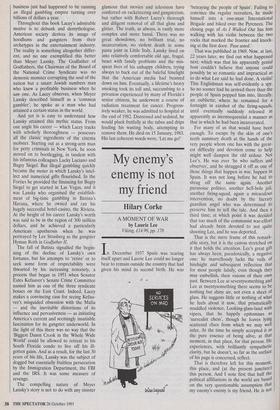My enemy's enemy is not my friend
Hilary Corke
A MOMENT OF WAR by Laurie Lee Viking, £14.99, pp. 178 In December 1937 Spain was tearing itself apart and Laurie Lee could no longer bear to remain outside the country that had given his mind its second birth. He was `betraying the people of Spain'. Failing to convince the regular recruiters, he made himself into a one-man International Brigade and hiked over the Pyrenees. The closing page of As I Walked Out has him walking with his violin between the two rocks that marked the frontier and knock- ing at the first door. Pase usted.'
That was published in 1969. Now, at last, 22 years later, we find out what happened next: which was that his apparently genial host couldn't believe that anyone could possibly be so romantic and impractical as to do what Lee said he had done. A violin! This Englishman was self-evidently a spy. So no sooner had he arrived there than the people of Spain popped him into, literally, an oubliette; where he remained for a fortnight in earshot of the firing-squads, until eventually suddenly released in apparently as inconsequential a manner as that in which he had been incarcerated.
For many of us that would have been enough. To escape by the skin of one's teeth summary death at the hands of the very people whom one has with the great- est difficulty and devotion come to help might well dampen the old ardour. Not Lee's. He was ever 'he who suffers and observes', and he shrugged it off as one of those things that happen in war, happen in Spain. It was not long before he had to shrug off the same again. Another paranoiac politico, another hell-hole jail, another firing-squad, again a miraculous intervention, no doubt by the literary guardian angel who was determined to preserve him to tell the tale. And then a third time; at which point it was decided that too much of the communist war-effort had already been devoted to not quite shooting Lee, and he was deported.
That is the mere frame of this remark- able story, but it is the canvas stretched on it that holds the attention. Lee's great gift has always been, paradoxically, a negative one: he marvellously lacks the veils of hindsight and subsequent reflection that for most people falsify, even though they may embellish, their visions of their own past. Between Lee at seventysomething and Lee at twentysomething there seems to be nothing but shiny air, not even a sheet of glass. He suggests little or nothing of what he feels about it now, that prismatically muddled violence, Looking-glass-land with vipers, that he happily epitomises as `surrealist chess', though he leaves lying scattered clues from which we may well infer. At the time he simply accepted it as the pure essence of being alive, at that moment, in that place, for that person. He experiences, with brilliantly sympathetic clarity, but he doesn't, so far as the surface of his page is concerned, reflect.
That is therefore left for this moment, this place, and (at the present juncture) this person. And I note first that half the political affiliations in the world are based on the very questionable assumption that my enemy's enemy is my friend. He is not









































 Previous page
Previous page